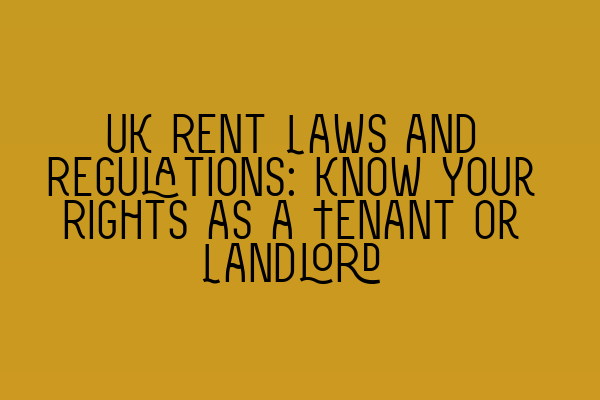UK Rent Laws and Regulations: Know Your Rights as a Tenant or Landlord
Renting a property in the United Kingdom involves a series of legal rights and obligations for both tenants and landlords. Understanding the intricacies of UK rent laws and regulations is essential for ensuring a smooth and mutually beneficial tenancy agreement. In this blog post, we will explore the key aspects of UK rent laws, highlighting the rights and responsibilities of both tenants and landlords.
1. Assured Shorthold Tenancy (AST)
The majority of residential tenancies in the UK are subject to an Assured Shorthold Tenancy (AST) agreement. An AST is a legally binding contract between a tenant and a landlord that allows the tenant to occupy a property for a fixed term. It provides the tenant with certain rights and protections throughout the tenancy.
2. Security of Tenure
Security of tenure refers to the right of a tenant to remain in a rented property for a specified period. Under the AST, tenants are entitled to security of tenure for the fixed term of the agreement, which means that they cannot be evicted without a valid reason. Landlords must follow the proper legal procedures if they wish to regain possession of the property.
3. Rent Payments
Tenants are required to pay rent as agreed in the tenancy agreement. The rent amount and frequency of payment should be clearly stated in the agreement. Landlords must provide tenants with written notice of any changes to the rent amount or payment terms. It is important for both parties to keep records of rent payments for future reference.
4. Deposit Protection
In the UK, landlords are required to protect their tenants’ deposits in a government-approved tenancy deposit scheme. This scheme ensures that tenants’ deposits are safeguarded and can be returned to them at the end of the tenancy, minus any deductions for damages or outstanding rent.
5. Repairs and Maintenance
Landlords have a legal obligation to maintain the property in a good state of repair throughout the tenancy. This includes ensuring that the property is safe, hygienic, and free from any hazards. Tenants should promptly report any repair issues to their landlord or letting agent, who should then arrange for necessary repairs to be carried out within a reasonable timeframe.
6. Notice Periods
Both tenants and landlords must provide notice if they wish to terminate the tenancy agreement. The notice period depends on the type of tenancy and the length of time the tenant has been in the property. It is important for both parties to follow the correct notice procedure as specified by UK rent laws to avoid any legal disputes.
7. Rent Increase
Landlords have the right to increase the rent during the tenancy, but there are specific procedures they must follow. The increase must be reasonable and the landlord must provide the tenant with proper notice of the rent increase. Tenants have the right to challenge an unreasonable rent increase through rent tribunals.
8. Eviction Process
If a landlord wishes to evict a tenant, they must follow the proper legal procedures. They must serve a valid notice and obtain a possession order from the court. Evicting a tenant without following the correct procedures is illegal and can result in penalties for the landlord.
9. Discrimination and Harassment
Both tenants and landlords have the right to be treated fairly and without discrimination. Landlords cannot discriminate against tenants based on their race, sex, religion, disability, or other protected characteristics. Similarly, tenants must also respect their landlord’s rights and not engage in any harassing or destructive behavior.
Knowing Your Rights as a Tenant or Landlord:
Understanding UK rent laws and regulations is crucial for both tenants and landlords. Being aware of your rights and responsibilities ensures a fair and transparent tenancy agreement. If you encounter any issues or have concerns about your tenancy, it is advisable to seek legal advice or contact organizations such as Shelter or Citizens Advice for further guidance.
For more information on legal matters and contracts, you may find the following articles useful:
– SQE Contract Law: Analyzing Landmark Cases and Influential Judicial Decisions
– Understanding Contractual Capacity: Rights and Limitations
– Interactive SQE Mock Tests for Contract Law: Test Your Knowledge
– Join Our SQE Contract Law Webinars: Expert Insights and Guidance
– SQE Prep: Mastering the Essentials of Contract Law
Remember, being well-informed about your rights and obligations as a tenant or landlord can contribute to a harmonious and successful tenancy experience.
